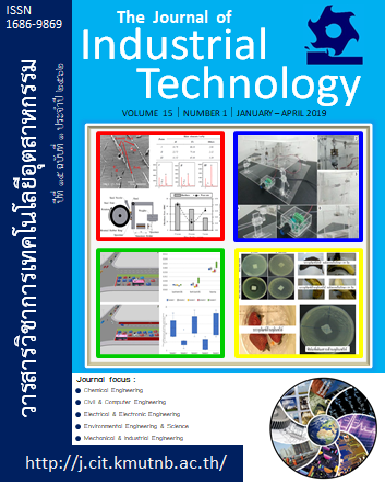(อิทธิพลของความเอียงต่อการเก็บกู้สินแร่ดีบุกด้วยโต๊ะสั่นแบบแห้ง)(Effects of Slope on Dry Shaking Table to Recovery Tin Ore)
Keywords:
Shaking table, Tin ore, mineral processing, miningAbstract
Dry shaking table is used to separate tin ore from sand. In this research, the segregation effect, friction between ore and surface, the table angles, riffle levels are observed. The results showed that the X-Y angles at 3,5 degrees gave the best of %tin ore recovery. All experiments were simulated by mathematic model in 3D equations to use in the program flowchart. The future work, the multiple shaking tables with various interval size levels will test on the pilot scale. And the electromagnetic system will be used to adjust slope on the dry shaking tables.
References
H. U. Sverdrup and P. Schlyter, "Modeling the survival of Athenian owl tetradrachms struck in the period from 561-42 BC from then to the present.," in Proceedings of the 30th international conference of the system dynamics society, St. Gallen, Switzerland, Vol. 5, pp. 4024-43, 2012.
S. Siriluck, "Neodymium magnet and mineral processing engineering," Engineering Journal, Chiangmai University, Vol.20(2),pp. 1-9, 2013.
S. Siriluck and A. Chomseang, "Dressing Concentrated Iron-Ore from Iron-Ore Tailing Using High Alumina Jig Ragging By Concentrator Jig," in The 1st National Conference on Engineering Research for Thailand Development, Chiangmai, Thailand, 2011.
S. Roy, "Recovery Improvement of Fine Iron Ore Particles by Multi Gravity Separation," The Open Mineral Processing Journal, Vol.2(14), pp. 17--30, 2009.
F. Aplan, "Gravity Concentration," Fuerstenau, MC E Han, KN (Ed.). Principles of Mineral Processing. SME, pp. 185-219, 2003.
M. A. El-Reedy, "Concrete and Materials Tests," in Advanced Materials and Techniques for Reinforced Concrete Structures, Boca Raton, CRC Press , 2015, p. 137.
J. M. Moffatt, "Hydrostatics," in The Book of Science: A Familiar Introduction to the Principles of Natural Philosophy, Adapted to the Comprehension of Young People, Comprising Mechanics, Hydrostatics, Hydraulics, Pneumatics, Acoustics, Pyronomics, Optics, Electricity, Galvanism, Magnetis, London, Andesite Press, 2015, p. 152.
A. Gupta and D. S. Yan, “ Mineral Processing Design and Operations: an Introduction”, Amsterdam in Netherlands: Elsevier B.V, 2006.
E. H. H. Macdonald, “Alluvial Mining: the Geology, Technology, and Economics of Placers”, London: Chapman and Hall, 1983.
J. Thomas, "Principles of Gravity Separation in Gravity Separation Technology," In: Summarizes the design and operationof the Oliver Gravity separator., Colorado, Oliver Manufacturing Company, Rocky Ford, CO. , 1978, p. 19.
G. Dodbiba and T. Fujita, "Separation of Plastics for Recycling," in 7th World Congress on Recovery, Recycling and Re-integration, Beijing, China , 2005.
A. Jain, M. J. Metzger and B. Glasser, "Effect of Particle Size Distribution on Segregation in Vibrated Systems," Powder Technology, 237, pp. 543-553, 2013.


